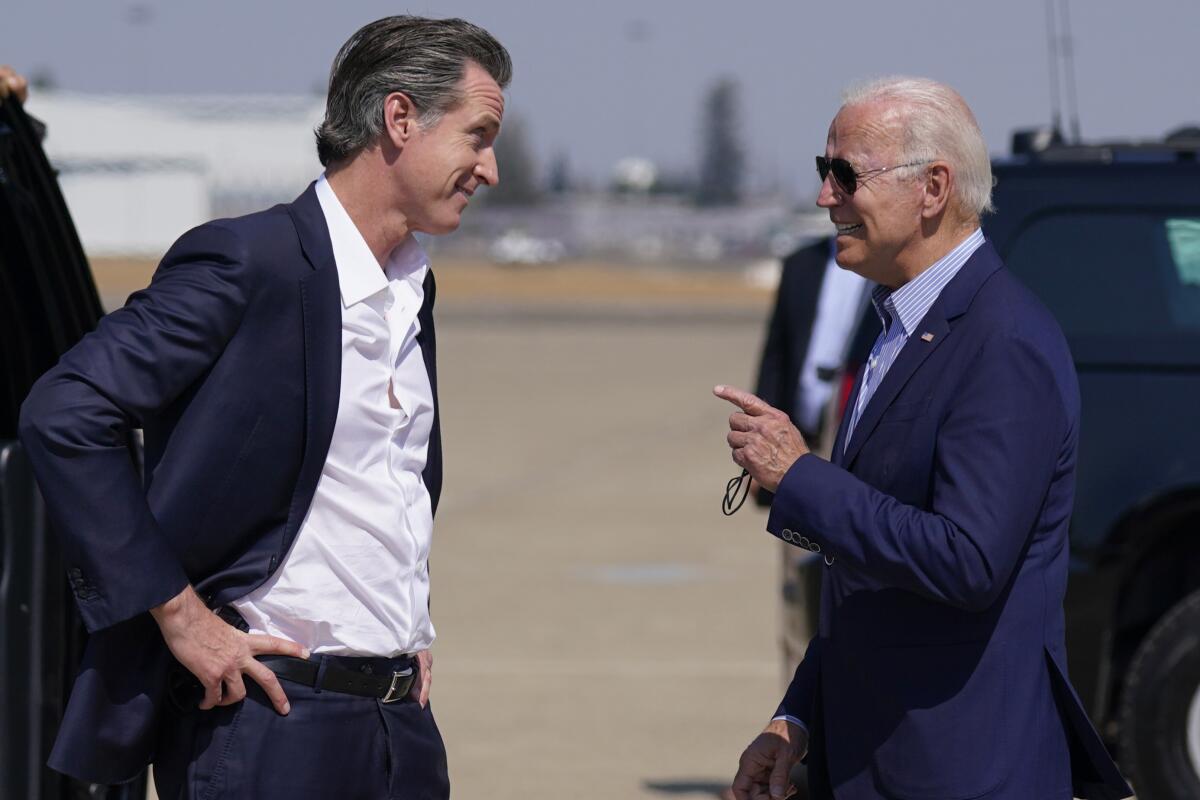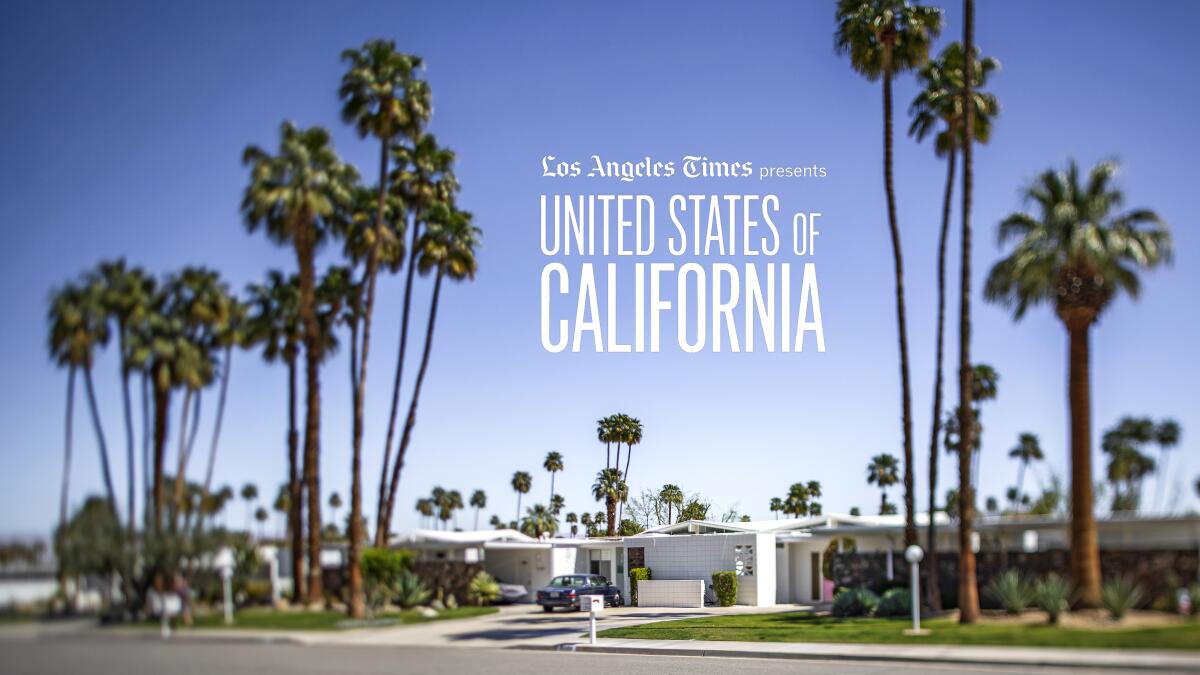Essential Politics: Is California’s influence in Washington on the wane? Maybe not

This was supposed to be California’s moment, with so many of the state’s politicians holding so many top jobs in Washington.
But it’s proving to be a bruising ride.
Hello there. I’m Evan Halper and welcome to Essential Politics: the United States of California edition.
Get our L.A. Times Politics newsletter
The latest news, analysis and insights from our politics team.
You may occasionally receive promotional content from the Los Angeles Times.
Let’s start with Vice President Kamala Harris, who is finding the post can be politically punishing and extremely inhibiting when the electorate sours on your boss, and your staff sours on you. Then there’s House Speaker Nancy Pelosi (D-San Francisco), who is wrangling with a Democratic Party suffering an identity crisis and a wave of retirements from her caucus ahead of what is likely to be brutal midterm election. And we can’t forget House Republican Leader Kevin McCarthy (R-Bakersfield), who hardly stands out as a profile in courage after acquiescing to the Big Lie and appeasing his party’s fringe elements.
Even Xavier Becerra, the California political veteran whose star seemed to be on the rise, is struggling to make a mark as secretary of Health and Human Services. His job performance has been panned by fellow Democrats in the White House and public health experts, clouding Becerra’s political future.
Even so, a reporting trip for my series on the United States of California reminded me that the state continues to steer the country, even at these times when its most visible personalities in Washington seem stuck in neutral.
I was with a team of ace Times videographers and photographers reporting on the next batch of stories for our series, which looks at our state’s impact on the policy direction of America. California has long been an incubator of ideas, and under the Biden administration it remains the nation’s de facto think tank.
California Dreams
Over the course of the series, which launched last year, we’ve looked at California policy innovations that have changed the nation — sometimes for the better, but not always.
The targets of our reporting have ranged from the outlawing of the all white-male corporate boardroom to complex carbon trading schemes to the state’s ambitious effort to realize Ronald Reagan’s vision for a return-free tax system.
Reporting out these stories has been instructive in charting how some of the Biden administration’s most ambitious and innovative plans could play out in real life.
Our most recent story, for example, looked at how the Central Valley’s tiny farmworker community of Huron is building a road map for the nation’s transition to electric vehicles. This place was for decades a transportation desert. But the mayor had a vision for building a shadow transit system around electric cars, through which community members can hail rides on an app to get to work, medical appointments or the store.
Zero-emission vehicles are an easy sell to wealthy early adopters. But integrating them into low-income communities is a more vexing — and urgent — policy issue. Huron is showing how it can be done, and the Biden administration has taken notice.
California’s influence over environmental and transportation policy is also clear as the Biden administration restores the state’s unique role in cleaning the air. The Environmental Protection Administration is essentially scrapping a Trump-era rule that was meant to block California from imposing vehicle emission regulations that are stricter than those required by Washington. The move highlights how the Biden administration is looking to California to guide the country on its journey toward using cleaner, more efficient cars and trucks.
The need to adopt such policies has been put into sharp relief by Russia’s invasion of Ukraine. As the world grapples with its reliance on Russian fossil fuels, California is unleashing innovations that would loosen that grip.
On our recent trip, we visited two refineries in the state that are abandoning crude oil to manufacture diesel fuel out of food waste, soybean oil and animal fat. A California program — called the Low Carbon Fuel Standard — motivated the switchover by requiring producers to offer progressively more climate-friendly fuels. While this shift toward biofuels is controversial — drawing warnings from analysts and environmental groups that the state risks creating just as many problems as it is solving — the program is having a huge impact. It has touched off refinery conversions across the country, and led industrial farming operations to shift their business models as they plot how to cash in on California’s incentives.
Look out for our comprehensive package on all that in the coming weeks. We are also going to soon publish a story examining how a Silicon Valley billionaire’s vision for revitalizing the nation’s poorest communities created a windfall for some of the richest Americans. And we are even taking a plunge into another (surprisingly) controversial issue: olive oil branding.
We look forward to sharing the stories with you, and hearing what you think.

Our daily news podcast
If you’re a fan of this newsletter, you’ll love our daily podcast “The Times,” hosted every weekday by columnist Gustavo Arellano, along with reporters from across our newsroom. Go beyond the headlines. Download and listen on our App, subscribe on Apple Podcasts and follow on Spotify.
Updates on Ukraine
— From Eli Stokols and Tracy Wilkinson: Biden announced on Tuesday that the U.S. will ban the importing of Russian oil, liquefied natural gas and coal, broadening the economic sanctions leveled against Moscow over its war in Ukraine.
— As persistently as Ukrainians demand a no-fly zone to protect them from Russia, the U.S. and NATO just as steadily insist it can’t be done. Wilkinson explains why.
— Director of National Intelligence Avril Haines told lawmakers Tuesday morning that Russian President Vladimir Putin did not expect the level of Ukrainian resistance to his invasion, nor the sanctions. He may escalate his attacks in response, reports Sarah D. Wire.
Enjoying this newsletter? Consider subscribing to the Los Angeles Times
Your support helps us deliver the news that matters most. Become a subscriber.
The latest national stories
— Congressional leaders reached an agreement early Wednesday on a massive $1.5-trillion spending bill — including $13.6 billion in aid for Ukraine, and additional funding for the pandemic — to keep the government’s doors open for the next six months, writes Jennifer Haberkorn.
— Florida Republicans on Tuesday passed a bill to forbid instruction on sexual orientation and gender identity in kindergarten through third grade, rejecting a wave of criticism. Republican Gov. Ron DeSantis is expected to sign it into law.
— A Texas man was convicted Tuesday of storming the U.S. Capitol with a holstered handgun, interfering with police officers and obstructing justice. It’s a milestone victory for federal prosecutors in the first trial among hundreds of cases arising from last year’s riot.
— From David G. Savage: The Supreme Court refused to review the Pennsylvania state court ruling that overturned the criminal sex-abuse convictions against comedian Bill Cosby.
The view from California
— Gov. Gavin Newsom cast the state as a beacon of democracy in a turbulent world in his annual address to lawmakers Tuesday, contrasting the “California way” through its embrace of diversity and inventive solutions with the politics of division and rising “authoritarian impulses” in America, report Taryn Luna and Phil Willon. Newsom also promised a tax rebate as high gasoline prices weigh on the minds of voters and his Republican critics.
— Pelosi endorsed her “colleague and friend” Rep. Karen Bass in the Los Angeles mayor’s race on Monday. She characterized Bass as a coalition builder who fights for social and economic justice, reports Julia Wick.
— Benjamin Oreskes and Maloy Moore report that Los Angeles City Councilman Joe Buscaino, who is running for mayor, has spent tens of thousands of dollars from his officeholder account on trips to Hawaii, Italy and elsewhere for his family since he was elected.
— More than a year after a Los Angeles Times investigation into the Hollywood Foreign Press Assn., Rep. Joyce Beatty (D–Ohio) and Rep. Brenda L. Lawrence (D–Mich.) have asked the Internal Revenue Service to investigate the tax-exempt status of the organization behind the Golden Globes.
Sign up for our California Politics newsletter to get the best of The Times’ state politics reporting.
Stay in touch
Keep up with breaking news on our Politics page. And are you following us on Twitter at @latimespolitics?
Did someone forward you this? Sign up here to get Essential Politics in your inbox.
Until next time, send your comments, suggestions and news tips to [email protected].
Get the L.A. Times Politics newsletter
Deeply reported insights into legislation, politics and policy from Sacramento, Washington and beyond. In your inbox three times per week.
You may occasionally receive promotional content from the Los Angeles Times.




